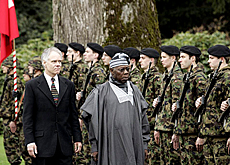Swiss and Nigerians put Abacha dispute to rest

Nigerian President Olusegun Obasanjo and Swiss President Moritz Leuenberger have hailed the restitution to Nigeria of funds stolen by late dictator Sani Abacha.
Switzerland has returned almost all the $700 million (SFr910 million) stashed by Abacha and his associates in Swiss banks between 1993 and 1998.
Leuenberger said the collaboration between the two countries over the stolen funds had been “exemplary”.
Speaking after two hours of talks in Bern on Thursday, Obasanjo agreed that the cooperation between Switzerland and Nigeria could serve as a “model” to others, even if it had taken some time to reach a satisfactory outcome.
The Swiss authorities say that 99 per cent of the funds have now been handed back, with just $7 million still in legal limbo.
Around $50 million had originally been held back because of concerns over how the funds would be used in Africa. The Swiss feared that the money would not be used for development projects in key sectors such as health, education and basic infrastructure.
Abacha is believed to have plundered more than $2.2 billion (SFr2.86 billion) from state coffers in Nigeria. About $700 million was frozen in Switzerland in 1999, shortly after the dictator’s death from an apparent heart attack.
Despite attempts by Abacha’s family and associates to have the funds handed over to them, the Swiss courts ruled that the money should be returned to the Nigerian government.
Switzerland and Nigeria signed an agreement last September stipulating that the World Bank would monitor the use of returned funds, after Obasanjo accused Switzerland of stalling payments.
Nigeria has also been pushing, with some success, for the return of Abacha’s loot from other countries, including Britain, Luxembourg, Liechtenstein and Austria.
Migration
Discussions between Leuenberger and Obasanjo, who met on the sidelines of the World Economic Forum summit in Davos earlier this year, also focused on a series of bilateral accords, including one on migration.
Nigeria still has to ratify a readmission accord for asylum seekers whose requests have been turned down by the Swiss. The Nigerian president promised Leuenberger he would push for ratification.
Large numbers of Nigerians have sought asylum in Switzerland in the past. Requests peaked in 2002 in Switzerland, totalling nearly 1,100.
At the time, Nigerians constituted the fourth largest group of asylum seekers behind citizens of Serbia-Montenegro, Turkey and the former Yugoslav Republic of Macedonia.
This figure has dropped significantly since then, falling to levels similar to those found in the mid-1990s. The Federal Migration Office has extended a programme to encourage those whose requests have been turned down to return home.
The Swiss launched the programme in 2003 as part of a readmission accord with Nigeria. Asylum seekers who arrived before January 1 this year will receive financial aid if they agree to go back home.
An individual heading back can receive up to SFr2,000 from the Swiss authorities, another SFr5,000 for projects in Nigeria, as well as support from cantonal authorities.
The two presidents also agreed to open talks on bilateral accords on air traffic and double taxation.
Obasanjo was expected to meet Swiss business representatives during his Swiss visit. Nigeria is Switzerland’s third-biggest trading partner in Africa behind South Africa and Libya, and its second-biggest oil supplier.
swissinfo with agencies
According to the Swiss Bankers Association, Switzerland probably has the world’s most comprehensive and effective mechanism for dealing with money from criminal sources.
The 1998 Money Laundering Act obliges all financial intermediaries to identify all clients and beneficiaries of assets.
They must also report any justified suspicion of money laundering to the authorities and freeze suspicious assets.
But the association says that due to the large amount of foreign asset management in Switzerland, the chances of a dictator stashing illegal funds in Switzerland is relatively high.
Nigeria is the most populous country in Africa, with more than 120 million inhabitants and 250 ethnic groups.
The country is a federal republic, made up of 36 states plus the federal capital territory of Abuja.
Nigeria re-achieved democracy in 1999 after a 16-year period of corrupt and brutal military dictatorships.

In compliance with the JTI standards
More: SWI swissinfo.ch certified by the Journalism Trust Initiative


You can find an overview of ongoing debates with our journalists here. Please join us!
If you want to start a conversation about a topic raised in this article or want to report factual errors, email us at english@swissinfo.ch.